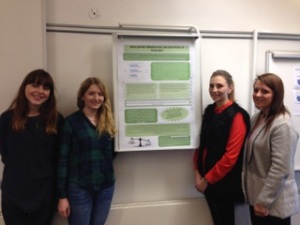by Pedro Castillo, Penny Karanasiou, Marwa Shamy and Lee Williamson
We are delighted to announce the publication of the Special Issue (number 12) of New Voices in Translation Studies.
The issue includes a selection of the best papers submitted after IPCITI 2013, organised in Heriot-Watt, and it is the result of the long standing collaboration between IPCITI and New Voices in Translation Studies.
This Special Issue of New Voices in Translation Studies results from the 9th International Postgraduate Conference in Translation and Interpreting (IPCITI), which was held at Heriot-Watt University in 2013. We, as Guest Editors of this special issue, are proud to have been involved in the editing and publication process of this journal. The 18 months between the release of the Call for Papers and the final publication have been among the most enriching experiences in our early academic careers. The papers that feature in this special issue reflect the aims of the IPCITI 2013 conference. These were twofold: on the one hand, the conference sought to promote greater participation in Translation and Interpreting (T&I) research by addressing salient issues in the field; and on the other, to foster a supportive environment in which young researchers could exchange ideas on current themes and issues in Translation and Interpreting Studies.
IPCITI 2013 was a great success, with 40 paper and poster presentations from 32 universities across 11 countries. The overall attendance included 82 delegates from universities across Europe (58), Asia (8), Africa (1), and the Americas (4). The range of papers and posters covered such diverse areas of T&I as Translation Theory, Pedagogy, Literary Translation, Interpreting (spoken and sign language) and Audiovisual Translation (AVT). The papers accepted underwent a rigorous peer-review process, and we believe that the authors present fresh perspectives on T&I, displaying both originality and methodological rigour.
We hope the readers of this special issue will appreciate the valuable contribution that these four papers make to pushing the boundaries of knowledge in Translation and Interpreting Studies, but also the opportunities that journals such as New Voices in Translation Studies offer to new researchers in allowing them to disseminate the results of their research more widely.
Pedro Castillo, Penny Karanasiou, Marwa Shamy and Lee Williamson
The IPCITI Special Issue Guest Editors


